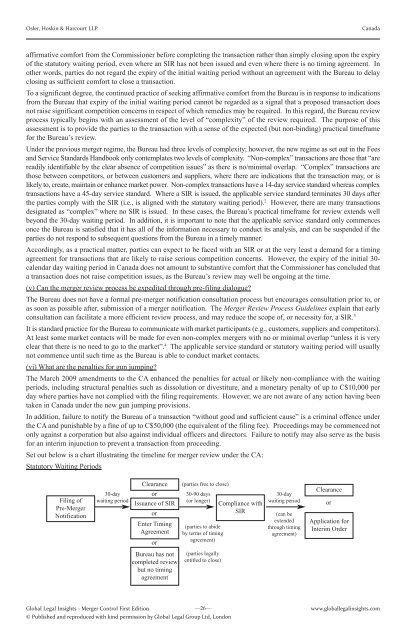Merger Controls First Edition - J Sagar Associates
Merger Controls First Edition - J Sagar Associates
Merger Controls First Edition - J Sagar Associates
Create successful ePaper yourself
Turn your PDF publications into a flip-book with our unique Google optimized e-Paper software.
Osler, Hoskin & Harcourt LLP Canada<br />
affirmative comfort from the Commissioner before completing the transaction rather than simply closing upon the expiry<br />
of the statutory waiting period, even where an SIR has not been issued and even where there is no timing agreement. In<br />
other words, parties do not regard the expiry of the initial waiting period without an agreement with the Bureau to delay<br />
closing as sufficient comfort to close a transaction.<br />
To a significant degree, the continued practice of seeking affirmative comfort from the Bureau is in response to indications<br />
from the Bureau that expiry of the initial waiting period cannot be regarded as a signal that a proposed transaction does<br />
not raise significant competition concerns in respect of which remedies may be required. In this regard, the Bureau review<br />
process typically begins with an assessment of the level of “complexity” of the review required. The purpose of this<br />
assessment is to provide the parties to the transaction with a sense of the expected (but non-binding) practical timeframe<br />
for the Bureau’s review.<br />
Under the previous merger regime, the Bureau had three levels of complexity; however, the new regime as set out in the Fees<br />
and Service Standards Handbook only contemplates two levels of complexity. “Non-complex” transactions are those that “are<br />
readily identifiable by the clear absence of competition issues” as there is no/minimal overlap. “Complex” transactions are<br />
those between competitors, or between customers and suppliers, where there are indications that the transaction may, or is<br />
likely to, create, maintain or enhance market power. Non-complex transactions have a 14-day service standard whereas complex<br />
transactions have a 45-day service standard. Where a SIR is issued, the applicable service standard terminates 30 days after<br />
the parties comply with the SIR (i.e., is aligned with the statutory waiting period). 2 However, there are many transactions<br />
designated as “complex” where no SIR is issued. In these cases, the Bureau’s practical timeframe for review extends well<br />
beyond the 30-day waiting period. In addition, it is important to note that the applicable service standard only commences<br />
once the Bureau is satisfied that it has all of the information necessary to conduct its analysis, and can be suspended if the<br />
parties do not respond to subsequent questions from the Bureau in a timely manner.<br />
Accordingly, as a practical matter, parties can expect to be faced with an SIR or at the very least a demand for a timing<br />
agreement for transactions that are likely to raise serious competition concerns. However, the expiry of the initial 30calendar<br />
day waiting period in Canada does not amount to substantive comfort that the Commissioner has concluded that<br />
a transaction does not raise competition issues, as the Bureau’s review may well be ongoing at the time.<br />
(v) Can the merger review process be expedited through pre-filing dialogue?<br />
The Bureau does not have a formal pre-merger notification consultation process but encourages consultation prior to, or<br />
as soon as possible after, submission of a merger notification. The <strong>Merger</strong> Review Process Guidelines explain that early<br />
consultation can facilitate a more efficient review process, and may reduce the scope of, or necessity for, a SIR. 3<br />
It is standard practice for the Bureau to communicate with market participants (e.g., customers, suppliers and competitors).<br />
At least some market contacts will be made for even non-complex mergers with no or minimal overlap “unless it is very<br />
clear that there is no need to go to the market”. 4 The applicable service standard or statutory waiting period will usually<br />
not commence until such time as the Bureau is able to conduct market contacts.<br />
(vi) What are the penalties for gun jumping?<br />
The March 2009 amendments to the CA enhanced the penalties for actual or likely non-compliance with the waiting<br />
periods, including structural penalties such as dissolution or divestiture, and a monetary penalty of up to C$10,000 per<br />
day where parties have not complied with the filing requirements. However, we are not aware of any action having been<br />
taken in Canada under the new gun jumping provisions.<br />
In addition, failure to notify the Bureau of a transaction “without good and sufficient cause” is a criminal offence under<br />
the CA and punishable by a fine of up to C$50,000 (the equivalent of the filing fee). Proceedings may be commenced not<br />
only against a corporation but also against individual officers and directors. Failure to notify may also serve as the basis<br />
for an interim injunction to prevent a transaction from proceeding.<br />
Set out below is a chart illustrating the timeline for merger review under the CA:<br />
Statutory Waiting Periods<br />
Filing of<br />
Pre-<strong>Merger</strong><br />
Notification<br />
30-day<br />
waiting period<br />
Clearance<br />
or<br />
Issuance of SIR<br />
or<br />
Enter Timing<br />
Agreement<br />
Global Legal Insights <strong>Merger</strong> Control <strong>First</strong> <strong>Edition</strong><br />
—26—<br />
© Published and reproduced with kind permission by Global Legal Group Ltd, London<br />
or<br />
Bureau has not<br />
completed review<br />
but no timing<br />
agreement<br />
(parties free to close)<br />
30-90 days<br />
(or longer)<br />
(parties to abide<br />
by terms of timing<br />
agreement)<br />
(parties legally<br />
entitled to close)<br />
Compliance with<br />
SIR<br />
30-day<br />
waiting period<br />
(can be<br />
extended<br />
through timing<br />
agreement)<br />
Clearance<br />
or<br />
Application for<br />
Interim Order<br />
www.globallegalinsights.com


